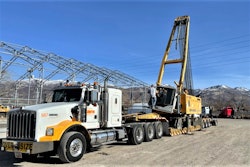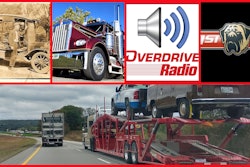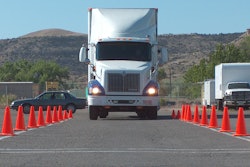Happy New Year to all of you! 2021 has no doubt been a strange one for our supply chains, with trucking shining as never before, in many ways. Yet at once, trucking seems to be getting more of the critique than any other of the multiple modes and businesses that connect all the supply chain parts. I have tried several times to point out that the issues in trucking that relate to driver retention are many, and that each needs to be addressed if real change is to happen. One of those issues is general driver training inadequacy.
It’s been a while, but regular readers may well remember that I proposed a graduated CDL and apprenticeship program in this story from 2018.
[Related: Modest proposal: Outlining a federal, graduated CDL]
Finally, at least it does seem we have the feds’ attention around some of these issues. The Department of Labor, in collaboration with the White House and the DOT, has kicked off a so-called “90-Day Trucking Apprenticeship Challenge” as of December 16. The effort hopes to stimulate the registered-apprenticeship model as a way to develop well-trained drivers on the road. The challenge asks employers to step up and commit to fast-tracking the advancement of new programs and increase existing ones through employer and labor partnerships to promote recruitment, retention, and bedrock return-on-investment in trucking.

So the challenge has been issued, or the gauntlet thrown down, but what exactly does that mean? The objective of building awareness in the power of apprenticeship sounds great. Procuring a commitment from employers, labor partners and/or industry associations to increase apprenticeship opportunities sounds great. Accelerating the process sounds risky. Yet demonstrating the potential of an apprenticeship program to expand opportunities sounds good as well. We still run into the issues that limit such programs – namely difficulty insuring newbie drivers and, more generally, money to pay those drivers for on-the-job training that is a prime feature of the registered apprenticeship.
There is no getting around the fact that insuring inexperienced drivers costs more than experienced drivers. That alone will keep many employers, particularly small trucking businesses, from developing a program. That leaves us with current employers already running training programs, some of which are predatory programs funneling new trainees into lease-purchase deals at unfavorable terms. Or current programs which have already proven to place trainees into questionable situations. For instance, running trainees as a team operation rather than trainer-trainee models that run as solo ops with the trainee behind the wheel for at least 3 hours of the trainer’s 14-hour duty window, and in the jump seat for at least seven hours of the trainer’s driving clock.
I feel like the best approach to apprenticeship might well be a federal partnership with owner-operator businesses that would not only teach an apprentice the responsibilities of a pro driver but also teach how a small business is run. Why does this make sense? It’s not just a matter of the owner-operator’s prevalence in trucking. Owner-ops take the best care of their equipment, generally speaking, doing more thorough pre- and post-trip inspections. On-highway, I’d wager owner-ops have better safety practices. One accident can be the difference between running a profitable business and taking care of the family – or being out of business completely and losing everything.
At the same time, if the new driver can develop a sense of what it takes to run a successful business from the owner-operator’s perspective, then if or when they hire onto a company, they can take that knowledge into all the relationships they encounter within the company, from their driver manager to the CEO. That stands to yield a greater understanding on the part of a driver of his/her company’s motivations, diminishing much of the turmoil created by a lack of understanding, and improving retention.
For a trainer owner-op, too, independent of a larger carrier, the driver is well set up to be that owner’s ticket to growth, to expand his/her own fleet.
I’d also wager such a trained driver would be much more well-prepped as a customer service representative at the docks and on the highways – yes, trucks and trailers branded with company insignia and hauled down the public road make that driver a front-line customer service rep, there’s no doubt.
[Related: 'It can't be all about the money': How to pay drivers in respect, not just cash]
Back in 2020 I proposed an owner-operator mentor program somewhat like this to the Owner-Operator Independent Drivers Association but was immediately hit with the reality of insurance cost and underwriting, which is understandable. However, that does not mean the concept cannot work.
I think the feds are going to have to step up to the plate and put their money where their mouth is, offsetting some of the excess cost of on-the-job training. Otherwise, the 90-day challenge is just all talk and status quo to make them look good, with no real impact.
Companies like Landstar might be ideal participants in a mentoring program like this, given they have such a diverse equipment profile with multiple trailer types and are in large part made up of owner-operators who themselves could not only benefit from the program with added labor but with potential new hires to grow their small fleets.
Following find a brief summary proposal I feel would make for a good program to implement with owner-operators to build a well-rounded professional driver. Mind you, this is just a summary, and the devil ultimately will be in the details if carried out. But what do you think?
[Related: Mentoring is a two-way street when it comes to benefits]
The Owner-operator Mentor Academy
The Owner-Operator Mentor Academy would be a group of professional owner-operators who have elected to become mentors/CDL-training instructors. Each owner will agree to take a prospective student over-the-road for on-the-job training for a period of at least 3 months of a student’s one-year apprenticeship training program.
Students must first hold a current CDL learner’s permit to receive on-the-job training, and at the end of their first three months of training they must pass the driving portion of their individual state’s CDL examination.
For each student to gain a clear understanding of which type of operation they should pursue and a well-rounded training experience, they will be trained for three months in each of the following types of operations: Dry van, Refrigerated van, Flatbed, and Tanker. Each student should agree to and anticipate completing the full one-year program to receive an OOMA diploma. Student tuition will be based on insurance rates, offset by wages based on average driver pay for on-the-job training (it must meet state minimum wage standards).
Upon completion, students will have the opportunity to work with any of their trainers if a position is available, or entertain a position with a company accepting graduates.
Each trainer/mentor will adhere to all guidelines for training and safe operation, teaching students situational awareness, trip planning/map reading, and the federal rules and regulations, from the hours of service to equipment regulations, pre- and post-trip inspections, proper securement of loads and more.
Each trainer/mentor must have a minimum of five years of experience, a clean motor vehicle record, and safe operational equipment. Trainers will be encouraged to teach the business of owning and operating a small trucking business, thereby offering a well-rounded view of expenditures running a trucking business.











